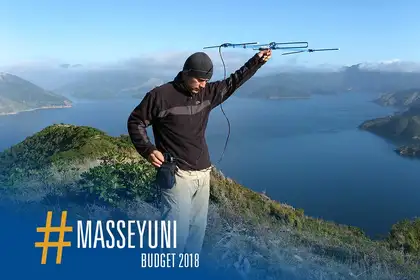
Dr Luis Ortiz-Catedral tracks birds for his field research.
By Dr Luis Ortiz-Catedral
Kiwis may not realise it, but the Department of Conservation (DOC) is at the forefront of the global movement to preserve biodiversity. The world is taking notice DOC’s approaches to saving species and restoring ecosystems. The recently-announced $81.3m funding from the central Government to support DOC’s efforts to control predators is therefore great news.
This funding is helping pave the way to a Predator-Free New Zealand 2050, and keeps New Zealand on track to meet the 2020 Aichi Biodiversity Targets. But with only two years to the deadline there is still a lot of work to do, and over the next decade, biodiversity conservation will require more complex solutions, not just the scaling up of what works now.
Consider this: nearly 40 per cent of the world’s most threatened and endangered species live on islands. This includes New Zealand endemics like the Kakapo and Pekapeka (bats). With New Zealand’s strategic position in the South Pacific, and the fact we are leading the way in the conservation of island species and island ecosystems, this country could become a true conservation powerhouse. For this to happen, there needs to be an investment to strengthen the ‘green ties’ to South Pacific nations to promote the exchange of expertise and conservation linked to social development and sustainability.
Worldwide there is a growing interest in channelling some of the trillions of dollars available through private investors towards biodiversity conservation. New Zealand could accelerate the impact of its conservation work by investing in the development of responsible schemes for private investment in conservation in this country and neighbouring South Pacific nations.
Another area that requires investment is conservation science. The lack of opportunities for conservation scientists in this country is shocking. Many of our best conservation scientists leave New Zealand to take positions overseas, making it harder to bridge the gap between conservation science and practice. You cannot have good conservation on the ground without good conservation science developed here in our own universities and national institutes. We need to support and promote ‘green careers’ among Kiwi kids, in particular among Māori.
We also need urgent investment on marine biodiversity. The State of the Gulf 2017 reveals a crisis has been brewing right under our noses. Legislation is desperately needed, along with an expansion of the current marine reserves network.
Dr Luis Ortiz-Catedral is a conservation biologist who specialises in the conservation of critically endangered island birds. He lectures at Massey’s Institute of Natural & Mathematical Sciences.